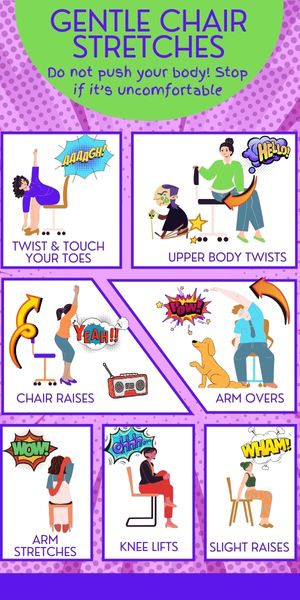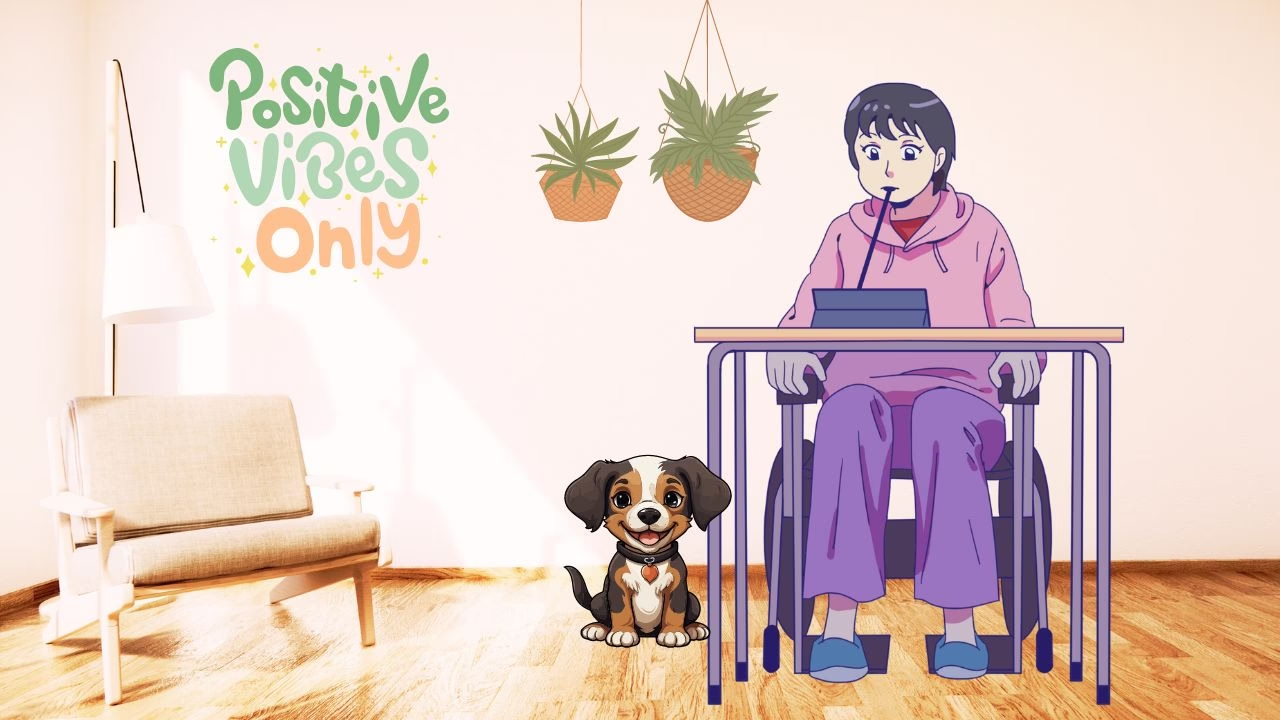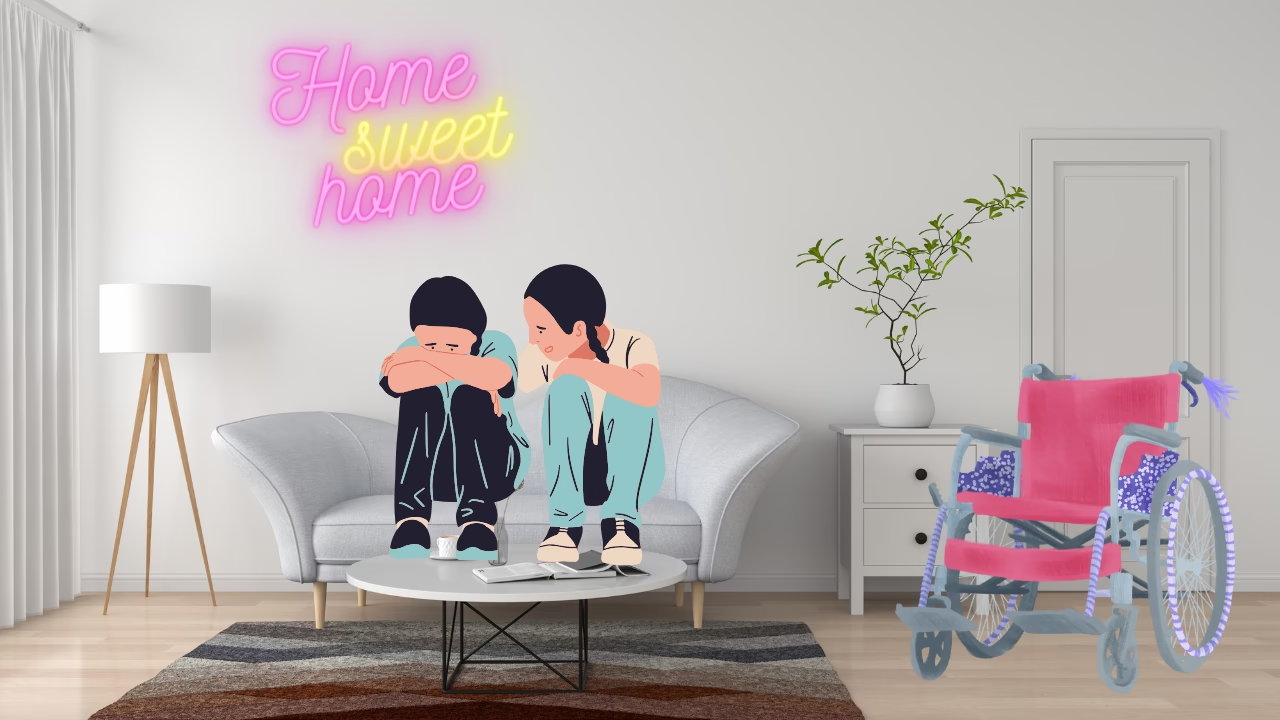Welcome, fellow hermit!
I have been housebound for many years. I want to share some of the techniques that I have learned, so I wrote this guide to being housebound. Being confined to the house may well be challenging. If you also have a physical disability, a psychological disorder, or a chronic illness, being housebound is especially hard. Feeling lonely and overwhelmed is natural, but it’s important to remember that your mental health is just as crucial as your physical health.
Whether you’re grappling with anxiety, loneliness, or feeling down, we’ll discuss it! I’ve added ideas for self-care, strategies to create social support, and even some sites for online therapy and mental health help.
So, whether you’re newly housebound or looking for new coping methods, read on to manage your mental health and thrive indoors.
How to cope with anxiety while housebound
When you’re confined to your home, it may be hard to manage your stress levels, but here are some things you can do to help keep anxiety under control.
First and foremost, you should determine your triggers. Which events or activities aggravate your anxiety? You can avoid or manage those situations by identifying what causes your tension. It’s when letters arrive that stresses me because I struggle to read and comprehend them.
Here are some practical things you can do for anxiety
Let’s start by trying some relaxation techniques. Deep breathing, meditation, and yoga are examples of such practices. Identify a tool that works for you and would include in your daily routine. Such a tool can be beneficial for soothing your mind and reducing worry. I tend to do some breath meditation work, then scan my letters to be read to me.
Remember to exercise regularly! Light activities, like stretching exercises or walking, can help lower your anxiety and improve your mood. Strolling is also a terrific way to get fresh air and switch things up. (Or chair dancing to some pumping tunes.)
Recognize that there is no one-size-fits-all strategy for dealing with anxiety while housebound. Finding the best coping skills may take some time and practice. Be gentle with yourself, and don’t be afraid to ask for external help if it becomes overwhelming.

Let’s talk about depression!
It’s normal to feel down or unmotivated when you’re stuck at home, but there are things you can do to help manage your symptoms.
First, try creating a routine for yourself. It can be easy to fall into a cycle of sleeping in, staying in your pyjamas all day, and not doing much else. However, having a daily routine can help you stay on track and give you a sense of purpose. Try setting a regular sleep schedule, planning meals, and scheduling activities throughout the day. Some activities might be reading, gaming, writing emails, spending time on social media, playing with your cat, or potting plants.

Connection is important!
Interacting with friends and relatives can also alleviate depression. When you’re feeling low, however, it can be distressing to connect with someone else. You may be concerned that they will pick up on your bad mood. You may feel that you have nothing besides your health to discuss, and no one wants to hear about it. If this is the case, ask them about themselves while you listen. You still get to connect, but you don’t have to indulge in your problems. Even if you can’t see them in person, try contacting them via phone calls, video chats, messaging, or in-game chat. Interacting with someone you trust might make you feel less solitary and offer you a much-needed connection.
Hobbies and activities might help you raise your mood and overcome boredom or depression. Adopting pastimes you enjoy, whether reading a book, working a puzzle, or learning a new skill, can help you feel more content and give you a sense of accomplishment. I started “Housebound Friends” because it gave me a sense of purpose and stretched my creative abilities.
Know that treating depression when housebound is difficult but not impossible. Set a routine, spend time with loved ones, engage in hobbies, and seek professional treatment when needed to improve your mental health and well-being.
housebound Loneliness is not the same as being alone
It’s normal to feel lonely when you’re isolated, but there are things you can do to help combat those feelings.
What about dating when you’re housebound?
Another way to combat loneliness is to try online dating, although it can be a mixed bag. You could find potential partners through apps and websites. However, as virtual relationships head towards meaningful relationships, a problem arises. Being housebound means your first meeting with a stranger will be at your home!
For this reason, exercise caution when using these platforms, as with any online interaction. Use a reputable and trusted dating site or app, and take the time to get to know someone before meeting in person. Have a friend with you for the first few meetings. Ensure your safety and well-being, and don’t feel pressured to engage in anything that makes you uncomfortable.
Fed up with the harsh scrutiny of virtual valentines? While this may appear contentious, you could hire an escort. They are more likely to undergo regular health exams and to behave professionally because it is their business. Use a trustworthy source, and ensure that someone you can depend on checks in with you right after you’ve met the escort. This is not an option for everyone, but it can be a means to meet your needs and combat feelings of loneliness.

Consider your personal circumstances, constraints, and the viability of various solutions. If you’re housebound, online dating may not be a practical or positive alternative.
Recognize that there is no one-size-fits-all strategy for coping with loneliness while housebound. Finding tactics that work best for you requires trial and error. Be kind to yourself; don’t be scared to experiment!
Alison Langtry
The importance of self-care while being housebound
Self-care is always important, but it is particularly crucial when you spend a long time alone at home. It is related to mental wellness. It means putting your well-being first and taking steps to deal with stress, anxiety, and loneliness. This can make you feel more at ease, energized, and optimistic.
Here are a few ideas to get you started:
- Practice relaxation techniques daily, such as deep breathing, meditation, or yoga. These hobbies can help relieve tension and promote relaxation.
- Take care of your physical health: eating nutritious foods, staying hydrated, and getting enough sleep. Exercise regularly, even if you only take a walk around the block.
- Identify hobbies and activities that you enjoy and schedule time for them. Hobbies and pastimes, like reading, writing, drawing, or watching a film, can make you feel more fulfilled and happy.
- Stay connected with family and friends through phone conversations, video chats, or messaging. The connection with people can be really beneficial to your mental health.
- Take time to pamper yourself: apply a facial mask, don a pair of hydrating foot socks, or sip herbal tea. Enjoy the calming aroma of joss sticks or scented candles.
- I’ve found that prayer and meditation can be incredibly grounding. Taking a few moments each day to pause, breathe, and connect with something greater than myself fosters a sense of belonging and understanding. I’ve also enjoyed reading spiritual texts that resonate with me. They offer wisdom and guidance that often feels quite timely like a friend giving me advice when I need it most.
Remember, self-care is a personal journey which looks different for everyone. Identify and prioritize the best daily activities and strategies suited to you.
Social Support Networks
When you spend considerable time at home, having support from a strong network of people is crucial. Feeling loved and cared for makes this situation more bearable. It can also provide a sense of security and stability in hard times. Ways to create a support network from home:
- Utilize technology to remain in contact: Messaging applications, video chat, and social media are all excellent methods for staying in touch with loved ones. Don’t be embarrassed to ask for help when needed. Make an effort to check in with your loved ones regularly.
- Join online communities. Another wonderful avenue for me has been joining community groups or online forums focused on spirituality. Sharing experiences and perspectives with others who are on a similar journey can illuminate paths I hadn’t considered before. It’s reassuring to know I’m not alone in my quest. Try joining a group that matches your needs or interests, then engage in the conversations. https://www.facebook.com/groups/houseboundfriends/
- Connect with local resources: Your community centre, senior centre, or church may have programmes or activities for the homebound. Contact them to find out what they offer in your area.
- Remote volunteering may be a terrific way to connect with others while giving back to your community. Look for virtual volunteer work that you can do from the comfort of your own home.
Understand that creating and maintaining support networks takes time and effort. Finding the right solutions and people can require some patience. Forming a support network is vital to enhancing your mental health and well-being.
Additional resources for you when you’re housebound
If your anxiety, depression, or loneliness are causing you significant grief, it may be time to seek professional help. Several therapists and mental health professionals provide virtual consultations so you can get the help you need without leaving your house. Online mental health resources, such as blogs, forums, and self-help tools, can also be beneficial.
Helplines and crisis services may also be lifelines for those confined to their homes. If you feel overwhelmed, nervous, or depressed, several hotlines and crisis services are available to help. These programs can offer immediate advice and connect you with local resources if necessary.
Here are some resources to consider:
UK:
- Samaritans: 116 123 (free 24/7 helpline)
- Shout: text “SHOUT” to 85258 (24/7 crisis text line)
- Mind Infoline: 0300 123 3393 (Monday to Friday, 9am to 6pm)
- Age UK (support for seniors): 0800 678 1602
- NHS urgent mental health helplines: https://www.nhs.uk/service-search/mental-health/find-an-urgent-mental-health-helpline
Australia:
- Lifeline Australia: 13 11 14 (24/7 crisis support)
- Beyond Blue: 1300 22 4636 (24/7 support line)
- Kids Helpline: 1800 55 1800 (24/7 phone and online counselling for young people aged 5 to 25)
- MensLine Australia (counselling for men): 1300 78 99 78
- Headspace: https://headspace.org.au/eheadspace/ (free online and phone support for young people aged 12 to 25)
New Zealand:
- Lifeline Aotearoa: 0800 543 354 (24/7 helpline)
- Depression Helpline: 0800 111 757 (24/7 helpline)
- Youthline: 0800 376 633 (24/7 helpline for young people)
- Need to talk?: https://www.1737.org.nz/ (free 24/7 text and phone counselling)
- Seniorline (support for seniors): 0800 725 463
Canada:
- Crisis Services Canada: 1-833-456-4566 (24/7 national crisis line)
- Kids Help Phone: 1-800-668-6868 (24/7 phone and text counselling for young people)
- Centre for Addiction and Mental Health (CAMH): 1-800-463-2338 (24/7 helpline for substance abuse and mental health)
- Canadian Mental Health Association (mental health support): 1-833-456-4566
- Suicide Prevention Service (suicide prevention): 1-833-456-4566
USA:
- National Suicide Prevention Lifeline: 1-800-273-8255
- Crisis Text Line: text HOME to 741741
- Substance Abuse and Mental Health Services Administration (SAMHSA) National Helpline: 1-800-662-HELP (4357)
- National Alliance on Mental Illness (NAMI) HelpLine: 1-800-950-NAMI (6264)
Remember, there is no shame in looking for support or using these services. Taking care of your mental health is vital.

To Wrap UP My Guide to Being Housebound
To sum up: identifying triggers, practising relaxation methods, exercising consistently, and getting professional treatment are all effective anxiety coping strategies. On the other hand, creating a routine, interacting with loved ones, engaging in hobbies and activities, and seeking professional treatment are critical for controlling depression. Loneliness is a normal feeling, but there are ways to combat it, such as getting a companion animal, finding charities, contacting local community centres, seeing therapists, visiting tutors, or trying online dating.
Ultimately, whether through quiet reflection, reading, connecting with others, or seeking a relationship with God, it has added a fulfilling layer to my life. It reminds me that even in the quiet moments, there’s a larger narrative at play that connects us all.
Take good care of yourself, stay connected with your people, and seek professional treatment if you’re suffering. There are tools and people to assist you through this challenging time; you are not alone.






